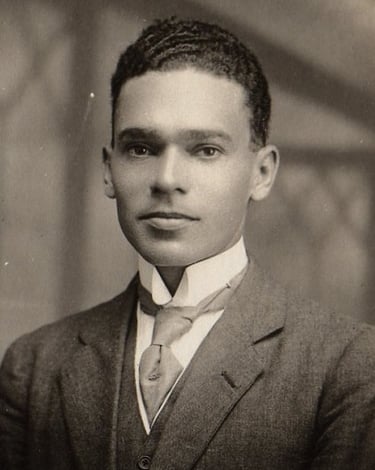

William Robbie Clarke - RAF Pilot
William Robinson Clarke was born on the 4th of October 1895 in Kingston, Jamaica. Growing up he had a love for mechanics and developed an interest in cars and vehicles in general and was one of the first people in Jamaica to learn how to drive. Clarke worked as a chauffeur in his early teens.
When the First World War broke in 1914 Clarke was just nineteen years of age. He paid for his own passage to Britain to offer his skills and service to the war effort. Clarke joined the Royal Flying Corps (RFC) as a mechanic and because he was already a skilled driver he was recruited as a driver for an observation company.
Clarke was shot through the spine and wounded in the face and back. Despite his injuries he managed to keep the aircraft in the air and was able to land safely near the base. A heroic act.
In a letter to his mum Clarke described the attack
"Before I could get away, I got a bullet through the spine. I managed to pilot the machine nearly back… but had to put her down as I was too weak to fly anymore."
Clarke spent months in hospital and although unable to fly again he continued to serve with the RFC (and later the RAF) as a mechanic until the end of the First World War.
In 1919 Clarke returned to Jamaica, this time his trip was paid for by the British government. He was also reimbursed for the cost of his original journey from Jamaica to the UK. In Jamaica, Clarke was made Life President of the Jamaican branch of the Royal Air Force Association and went on to become a successful builder.
William Robbie Clarke died on the 26th April 1981.
However, Clarke's dream was to fly. He repeatedly applied for pilot training but his applications were repeatedly turned down. He didn’t give up, Clarke gathered letters of recommendation and in December 1916 his persistence paid off - he was eventually accepted for pilot training. By April 1917 Clarke had qualified - he became the first Black pilot to fly for Britain.
Promoted to Pilot Sergeant Clarke was posted to No. 4 Squadron RFC at Abeele, Belgium. He flew R.E.8 biplanes, two-seater aircrafts, on missions. On the 28th July 1917 Clarke and his observer were flying a mission when they were ambushed by five German aircrafts.
"Before I could get away, I got a bullet through the spine. I managed to pilot the machine nearly back… but had to put her down as I was too weak to fly anymore."
William Robbie Clarke
